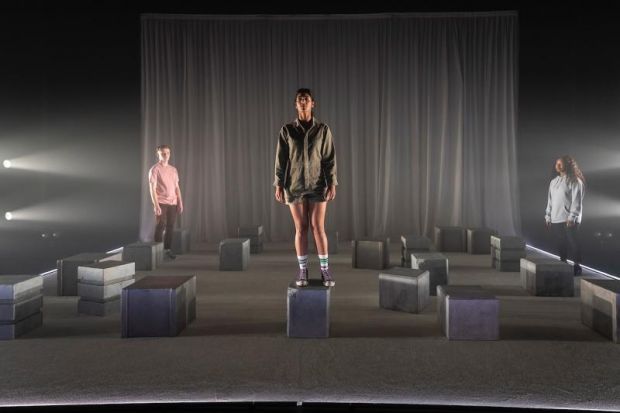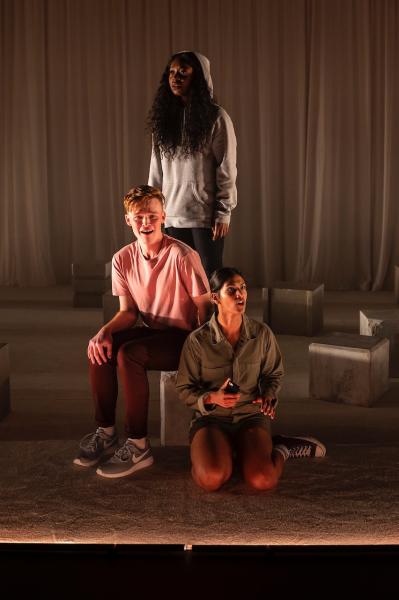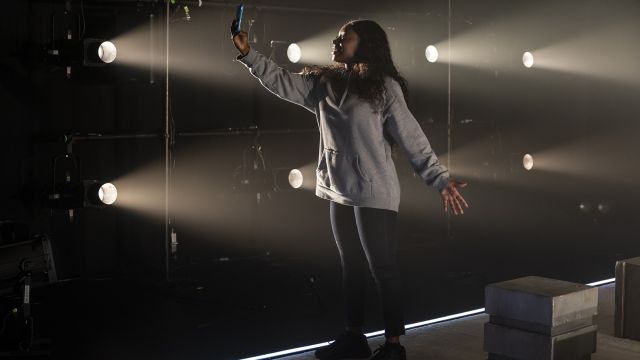SLAP. BANG. KISS.
Three very talented, focused young performers seamlessly play multiple characters and make SLAP. BANG. KISS an edge-of-the-seat rollercoaster ride. Text and direction mesh perfectly as three distinct storylines interweave across three time frames and multiple locations. Playwright Don Giovannoni’s choice of detail to evoke emotion, place, and action is finely precise. He reckoned that the best way to hear the characters’ stories is for them to tell us directly – and so they do, as well as interacting with others.
There’s no set – just sixteen chipped, grey concrete blocks or bollards (bold design by Kate Davis). Director Katy Maudlin not only gets her cast to distinguish cleanly and clearly between their different characters, she also moves them swiftly around the stage, through, around and up on the blocks, and piling them as platforms or barricades. We always know whose story is being told and where we are – helped by Amelia Lever-Davidson’s lighting and Ian Moorhead’s music and sound.

Immi (Tsungirai Washenuka) tells the audience how she’s walking home through the streets of her beleaguered city, hurrying, scared, trying to beat the curfew. In seconds, due to her intense, wide-eyed performance and the evocative text, we’re with Immi, we see the streets (we can almost smell them), the struggling crowds, the choked checkpoint where armed and bullying ‘peacekeepers’ are checking frantic people’s papers. In a moment, with TV news crews filming, Immi will do something decisive, something out of sheer angry, righteous impulse: she, a small teenage girl, will SLAP a ‘peacekeeper’.
Somewhere else, in a classroom in a quiet, normal high school, teenage student Sophia (Sarah Fitzgerald) is shocked as she hears shots and heavy footsteps drawing closer… Terrified, she huddles under a desk. And then the shooter is in the doorway… BANG. And Sophia’s fear will turn into outrage.

And, by complete, almost total contrast, sweet and endearing Darby (Conor Leach) tells us how he’s thrilled, over the moon, totally in love with Daniel – and how they’re going to go for the world’s longest KISS record – in public, in the carpark of their country town Woollies. Naturally some people are not as happy as Darby about this.
In each of these three stories, the lead character, whose story it is, is surrounded and supported by the other two actors, playing more characters – Sophia’s classmate Carl, Darby’s best friend Jasmine, Immi’s Mother, and so on. It’s clear that the text identifies these supporting characters by name and the transformations are always clear and, of course, delightful. You want to applaud how clear they are.

As Conor Leach says in a program note interview, each of these main characters spark a moment of activism – deliberate, accidental, or both. The personal (for instance, Immi is inspired by her fearless grandmother) and the political blur. Without giving anything away, we can say that each catalytic action gets attention, goes viral, and makes a difference, a demonstration that the individual and individual action can bring about change. And so, SLAP. BANG. KISS begins in danger, fear, and homophobic oppression, but ends in hope – and indeed joy.
SLAP. BANG. KISS has been some time in development – interrupted by lockdowns – and helped along by various developers and dramaturgs, all of whom Don Giovannoni generously acknowledges in his program note: the original director, Prue Clark, advisors Artemis Ioannides and Tahlec Fereday, and dramaturgs Chris Mead and Jenni Medway. Whatever their valued contributions, what we have now is a crisp, tight sixty minutes of engrossing storytelling. It leaves the audience re-evaluating what some might think are seemingly alienated, disaffected teenagers. And it insists, in the face of so much that we see around us, that resistance, optimism and hope are possible and essential.
Michael Brindley
Photographer: Tiffany Garvie.
Buy the script at Book Nook.
Subscribe to our E-Newsletter, buy our latest print edition or find a Performing Arts book at Book Nook.

